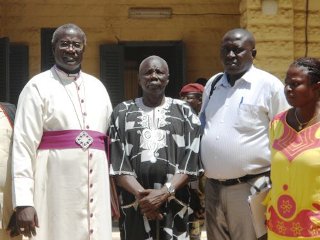“External intervention a setback to peace in Jonglei”: mediator
July 31, 2013 (JUBA) – A mediator in South Sudan’s Jonglei peace process has accused international actors of largely undermining national efforts to achieve peace and stability in the troubled region.

In May 2012, the paramount chiefs of all six communities in Jonglei State signed a peace agreement under the auspices of the Presidential Committee for Peace, Reconciliation and Tolerance in Jonglei State, the culmination of more than a year of work amongst the grassroots communities.
The agreement, according to the Archbishop, provided a framework for resolving the differences which had caused violence in the country’s largest state, involving various stakeholders and community members.
“All of these negative consequences might have been avoided, or been less severe, if more attention had been given by government, UN and NGOs to the implementation of the 2012 in Jonglei State,” partly reads Archbishop Bul’s letter.
He however said while the local communities made some concrete steps towards peace, there was “less” progress from other stakeholders.
“While a small number of NGOs attempted to implement relief and development programmes fairly quickly, the rapid response “peace dividend” called for by the agreement never materialised,” he said.
Deng, who headed the presidential peace initiative, further said “mishandling” of the peace agreement after it was signed provided an avenue for David Yau Yau rebels, operating in the remote Pibor areas, to re-arm and distabilise the population.
Yau Yau first rebelled against government after his failed bid to become a lawmaker for Gumuruk county in Jonglei during the 2010 elections. He later accepted an amnesty from South Sudan president in 2011, but rebelled again in April last year.
“The provision of a peace dividend equitably across the whole state remains an urgent priority,” he stressed.
In May this year, envoys from western nations called for a political, rather than a military solution to the conflict, with emphasis on dialogue.
“Ending the conflict in Jonglei State requires meeting basic needs and addressing the grievances of communities, distinct from meeting demands of rebel leaders”, the envoys said in a joint statement.
In recent months, however, there have been calls for international intervention in Jonglei peace process, after Yauyau rebels demanded involvement of neutral bodies.
But the Archbishop, in his letter, insisted that external intervention only halted the peaces process, instead of making it see light of the day.
He also expressed concerns that the rebellion against the central government and the conflict among communities are two different issues, thus creating a more complex situation.
“What is happening in Jonglei at the moment is a massive tragedy, but we reject the hopelessness which says it cannot be resolved, and the pessimism which suggests it will destabilise the whole nation,” said Bul.
We are concerned at the faulty analysis used by many within the international community, and their lack of understanding of the complexity and the long term roots of this crisis, he added.
AMNESTY CALLS
Meanwhile, the Archbishop, who currently chairs the committee on national healing, peace and reconciliation, has appealed to Yauyau and his followers to accept the amnesty offered by President Salva Kiir.
“We stand ready to meet him [YauYau] to facilitate this. We support the efforts of the many other players, including Murle elders and politicians, who are trying to persuade Yau Yau to accept the amnesty,” he said.
Bul, who constantly refers to Yauyau as “our brother” in his letter, urged the rebel leader to amicably resolve existing differences with the country’s leaders and desist from violence.
“Violence begets violence, and he risks destroying his community rather than helping it. The cycle of violence must be broken once and for all, and it takes a courageous man to do that,” he said.
(ST)
